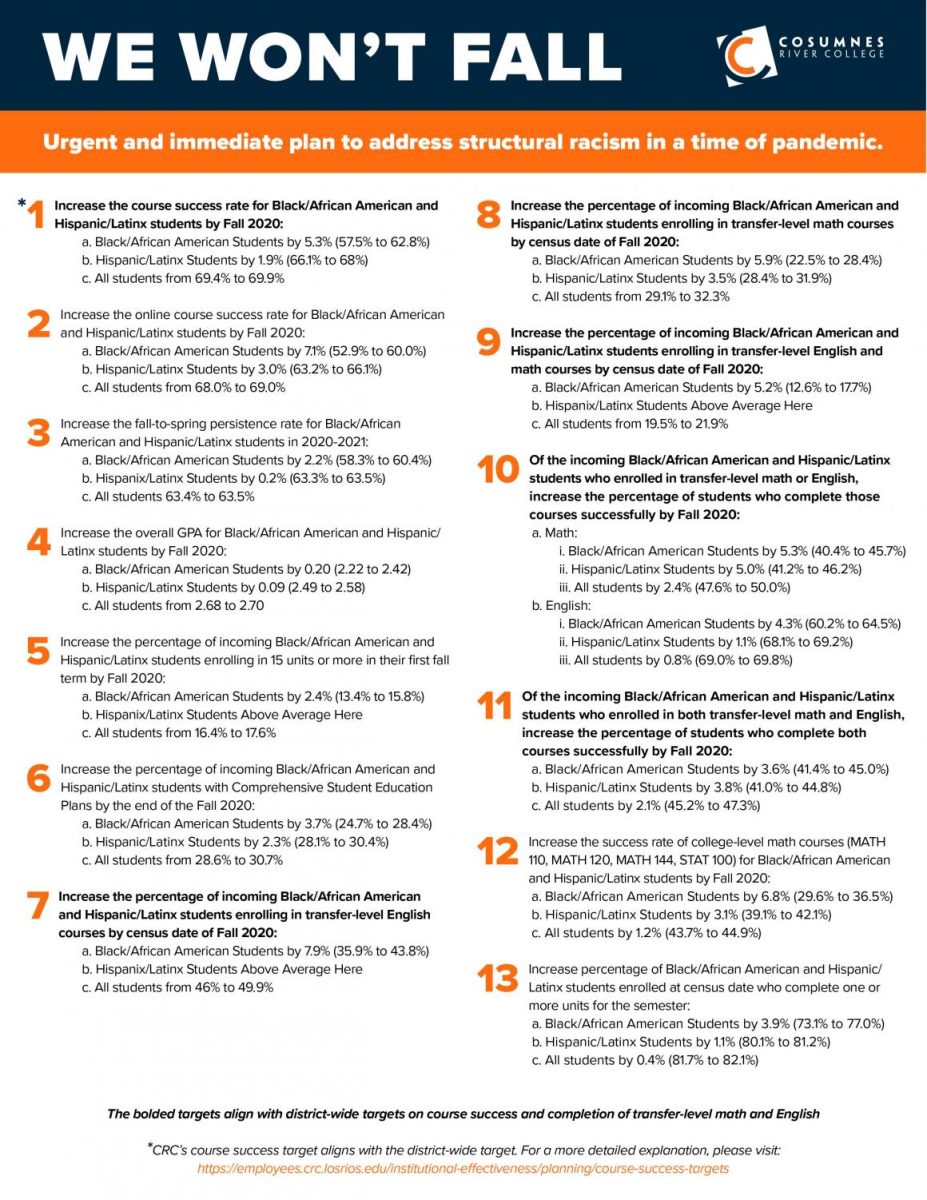Campus launches initiative to address structural racism
Cosumnes River College leadership has begun an “urgent and immediate plan to address
structural racism in a time of a pandemic” with 13 goals that hope to be completed by the end of this semester.
These 13 targets have been officially named the “We Won’t Fall” campaign, and have brought the conversation of racial equity to the forefront of administration’s discussions.
“It is imperative that action happens. We must act now,” said Biology Professor and past Academic Senate President Julie Oliver during an Academic Senate meeting on Aug. 28.
During the summer, CRC leadership called together a group to discuss what they could do to improve performance for Black and Latinx students, said Academic Senate President and History Professor Gregory Beyrer.
“We need to break the cycle of institutionalized barriers for whom our colleges are not designed,” said Beyrer.
Associate Vice President of Equity, Institutional Effectiveness and Innovation Tadael Emiru said the research and data clearly show that Black and Latinx students are at the bottom.
“When you look at the pace students are completing coursework to graduate, you see a disparity in both race and gender,” said Vice President of Student Services and Enrollment Management Claire Oliveros.
According to the data provided from the “We Won’t Fall” campaign poster, Black American and Latinx students report lower GPA’s, overall success rates and success rates in transfer-level English and math courses.
“You cannot measure something that doesn’t exist,” said Vice President of Instruction and Student Learning Robert Montañez.
As a result of the data, Beyrer hopes to ensure faculty members become more culturally responsive. Beyrer said he plans on offering training on how to be a culturally sensitive professor and is encouraging faculty to “look at their curriculum with an equity eye.”
“My hope is that all of us reflect on what it means to have our lives destroyed by things out of our control, and have that reflect in our syllabi,” said Beyrer.
Campus leaders want to assure their students that these changes and discussions will enrich the college experience for students of all ethnicities.
“Many of these programs will benefit all of our students, not just the African American and Latinx students,” said Montañez. “A great example of this would be our opt-out program, which benefits all students.”
While some efforts have already been put in place, Beyrer believes fundamental change is required. “Students will reap the benefits of these additional discussions,” said Beyrer.
These ideas are also shared by Emiru, Oliveros and Montañez.
“If we work to make our studies more inclusive, it will help all students. Even the students of whom colleges were designed for,” said Beyrer.
As campus leadership collaborates on ways to achieve these goals, many of them acknowledge that fundamental change needs to occur.
“I think the whole premise of this is to shift the culture from what we refer to as college ready to student-ready, when we frame the conversation as college-ready, we expect students to come and they need to be fixed,” said Emiru. “By shifting the conversation, CRC needs to be ready to work with students regardless of their level and background, that is where we can make a significant difference and close opportunity gaps.”
CRC leadership has been working on similar goals for a few semesters now, but the murder of George Floyd, Breonna Taylor and the recent shooting of Jacob Blake have expedited these concerns. However, the additional discourse around systemic racism and how to act on it evoked other points-of-view from faculty members.
“There’s a potentially dangerous hyperfocus on English and math, we cannot expect our English and math departments to transform on their own,” said Philosophy Professor Rick Schubert during the Aug. 28 Senate meeting. “I think we need to broaden the focus to quantitative reasoning and composition, otherwise we are in danger of hyper-focusing on math and English and continuing the structure that isn’t working.”
As CRC and the Los Rios Community College District continue to focus on actionable steps to improve equity and the lives of its students, Beyrer encouraged students and faculty to keep applying the pressure and to keep asking questions that need to be asked.
“Look at how fast we reacted in response to COVID, but yet we still haven’t fully acted in response to racism. It’s time to act,” said Oliver. “We should do it, and we need to do it, but I ask the question: are we gonna do it?”

